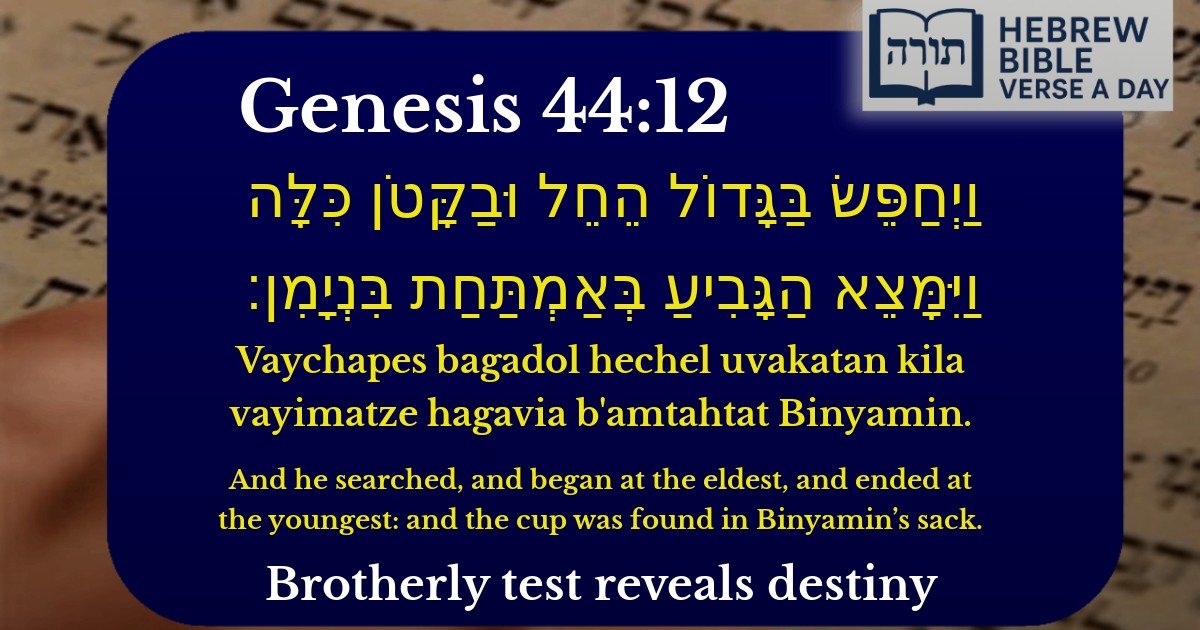Join Our Newsletter To Be Informed When New Videos Are Posted
Join the thousands of fellow Studends who rely on our videos to learn how to read the bible in Hebrew for free!
Hebrew Text
וַיְחַפֵּשׂ בַּגָּדוֹל הֵחֵל וּבַקָּטֹן כִּלָּה וַיִּמָּצֵא הַגָּבִיעַ בְּאַמְתַּחַת בִּנְיָמִן׃
English Translation
And he searched, and began at the eldest, and ended at the youngest: and the cup was found in Binyamin’s sack.
Transliteration
Vaychapes bagadol hechel uvakatan kila vayimatze hagavia b'amtahtat Binyamin.
Hebrew Leining Text
וַיְחַפֵּ֕שׂ בַּגָּד֣וֹל הֵחֵ֔ל וּבַקָּטֹ֖ן כִּלָּ֑ה וַיִּמָּצֵא֙ הַגָּבִ֔יעַ בְּאַמְתַּ֖חַת בִּנְיָמִֽן׃
וַיְחַפֵּ֕שׂ בַּגָּד֣וֹל הֵחֵ֔ל וּבַקָּטֹ֖ן כִּלָּ֑ה וַיִּמָּצֵא֙ הַגָּבִ֔יעַ בְּאַמְתַּ֖חַת בִּנְיָמִֽן׃
🎵 Listen to leining
Parasha Commentary
📚 Talmud Citations
This verse is quoted in the Talmud.
📖 Sotah 10b
The verse is referenced in the context of discussing the story of Joseph and his brothers, particularly focusing on the search for the cup in Benjamin's sack as an example of divine providence and the unfolding of events according to God's plan.


Context in the Narrative
This verse (Bereshit 44:12) describes Yosef's steward searching the brothers' sacks for the "stolen" silver goblet, starting with the eldest (Reuven) and concluding with the youngest (Binyamin). The goblet is ultimately found in Binyamin's sack, setting the stage for Yehudah's impassioned plea in the following chapter.
Rashi's Commentary
Rashi explains that Yosef's steward searched "from the eldest to the youngest" to avoid suspicion that he planted the goblet in Binyamin's sack. Had he begun with Binyamin, the brothers might have accused him of targeting the youngest. By searching in order of age, he demonstrated fairness (Rashi on Bereshit 44:12).
Midrashic Insights
Rambam's Perspective
Rambam (Moreh Nevuchim 3:36) interprets this episode as part of Yosef's Divine-guided plan to test his brothers' repentance. By framing Binyamin, Yosef forced them to confront their past cruelty toward a younger brother (himself) and choose righteousness over self-preservation.
Symbolism of the Goblet
The goblet (גביע) is identified by the Zohar (1:201b) as a symbol of kingship—foreshadowing Binyamin's future role as the ancestor of Mordechai and Esther, who would save Klal Yisrael. Its discovery in his sack hinted at his tribe's destined greatness.